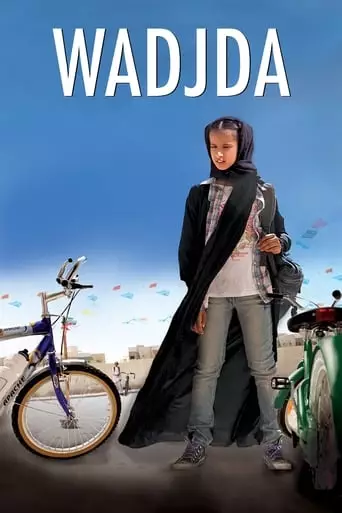
Wadjda (2012) Watch Online Free
An enterprising Saudi girl signs on for her school’s Quran recitation competition as a way to raise the remaining funds she needs in order to buy the green bicycle that has captured her interest
Wadjda (2012) is a landmark film directed by Haifaa Al-Mansour, making it the first feature film to be entirely shot in Saudi Arabia, as well as the first to be directed by a female Saudi filmmaker. Set in Riyadh, the film tells the story of a 10-year-old girl, Wadjda, who challenges the strict gender norms of her conservative society. The narrative revolves around Wadjda’s desire to own a green bicycle, a symbol of freedom and rebellion in a society where girls are discouraged from cycling. This journey becomes both a literal and metaphorical pursuit of autonomy and independence.
Wadjda is a spunky and ambitious girl who dreams of owning a bicycle, something deemed inappropriate for girls in her culture because it could supposedly harm their reputation. To fund the purchase, she competes in a Quran recitation contest at her school, navigating various hurdles such as societal expectations and a strained relationship with her mother. The film explores her internal and external conflicts, from her challenges with her strict headmistress to the pressures of a family grappling with societal norms.
Wadjda’s mother, also struggling under patriarchal expectations, serves as a secondary but essential character in the film, reflecting the limited choices available to women in Saudi Arabia. Despite the limitations they both face, Wadjda’s determination to buy the bike represents an act of defiance against the rigid gender roles that define her life. The film’s minimalist aesthetic and quiet, subtle direction underscore Wadjda’s quiet rebellion and the emotional depth of her journey.
One of the central themes of Wadjda is gender and the restrictive roles society imposes on women. It critiques a society where gender segregation is enforced and where girls like Wadjda are not allowed the same freedoms as boys. The film also explores the tension between tradition and progress, where Wadjda’s dreams symbolize a new wave of hope and change. Another key theme is the pursuit of personal freedom in a repressive environment, seen not only through Wadjda’s determination to buy the bike but also in her mother’s own sacrifices and internal struggles.
The film also addresses class differences, as Wadjda and her mother, despite their efforts, are caught in a system where status and wealth are often a measure of one’s ability to transcend traditional roles. Ultimately, the story is about resilience, agency, and the power of defiance in a world that seems determined to limit your potential.
Wadjda has been lauded for its groundbreaking portrayal of Saudi life, especially from the perspective of a young girl. The film has been widely praised for opening up conversations about women’s rights in Saudi Arabia and for breaking taboos by addressing topics like female independence and defiance in a deeply patriarchal society. Its international success has brought global attention to the work of women filmmakers in the Arab world and has become a symbol of quiet revolution. The film garnered critical acclaim and was the first Saudi film to be submitted for the Academy Awards, underscoring its significance in both the cinematic and social realms.
After watching Wadjda, you may feel a deep sense of admiration for the resilience and determination of the protagonist. The film’s exploration of gender inequality and the constraints placed on women may evoke feelings of frustration but also empowerment. You might reflect on the global challenges women face in patriarchal societies, and the ways in which hope and persistence can challenge even the most rigid of norms. The film’s bittersweet yet hopeful ending will likely leave you with a sense of hope for future change, tempered by the awareness of the long road ahead for those seeking greater freedoms.
Wadjda is both a cinematic triumph and a powerful social commentary, making it an essential watch for anyone interested in stories about empowerment, resistance, and the pursuit of dreams against all odds
